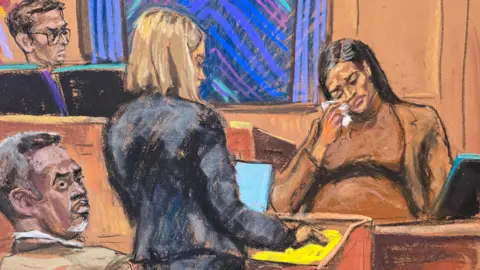**Tearful Casandra Ventura reveals abuse in court against Diddy**
In a shocking testimony at the ongoing trial of Sean “Diddy” Combs, his ex-girlfriend, Casandra Ventura, vividly recounted the physical and emotional trauma she allegedly suffered during their tumultuous 11-year relationship. Ventura, who emotionally addressed the court, accused the hip-hop mogul of not only controlling her life but also subjecting her to acts of sexual humiliation, leaving her feeling degraded and worthless. This case, which centers around serious charges including sex trafficking, has drawn substantial attention due to its high-profile nature and the serious allegations being presented.
Ventura, now 38 and expecting her third child, described the initial stages of her relationship with Combs as romantic and monogamous, although she later learned that he was involved with other women. Meeting Combs when she was a mere 19-year-old aspiring singer, Ventura shared that he signed her to his record label and their relationship quickly escalated into a romantic affair. However, as testified in court, the excitement of love slowly morphed into a suffocating situation where Combs purportedly sought to exert control over every aspect of her life, from her physical appearance to her career choices.
The alleged abuse reportedly began as psychological and financial control. Ventura described how Combs manipulated her by managing her finances, paying for her home, cars, and even her communication devices, which he would confiscate if she displeased him. She explained to the court that this need for control quickly escalated into physical violence. Through tears, Ventura alleged that Combs would frequently resort to physical abuse, hitting and kicking her, resulting in visible injuries such as swollen lips and black eyes. The jury heard harrowing accounts of her being beaten and left bruised due to Combs’ violent outbursts.
Central to the prosecution’s case are the so-called “freak-offs”—sex parties organized by Combs, involving male escorts. Ventura disclosed that these events were introduced during the early phase of their relationship, with Combs coercing her into participating to satisfy his desires. The emotional toll of these encounters was profound, as Ventura expressed feelings of humiliation and self-loathing during and after these experiences. She disclosed that she resorted to drug use— including marijuana and ecstasy— to cope with the trauma and to dissociate from the reality of the humiliation inflicted upon her.
The court heard that Combs would meticulously orchestrate these encounters, dictating even the outfits Ventura wore, alongside details of the sexual acts that were to unfold. These freak-offs, sometimes lasting for days, involved extensive planning and compensation for the male participants, with Combs allegedly paying them thousands of dollars for their services.
Prosecutors presented evidence indicating that Combs proactively involved Ventura in the arrangements, dictating whom to hire and even referring to the male escorts as “employees” roaming the globe with them. Ventura recounted cities like Los Angeles, New York, Las Vegas, and Ibiza as backdrops for these traumatic experiences, where Combs was the controlling figure throughout.
As Ventura continues her testimony, the weight of her allegations has created a compelling narrative that seeks to paint a picture of manipulation, coercion, and intense emotional trauma. Her revelations shed light on the darker side of celebrity relationships, challenging perceptions of power dynamics in situations involving fame and affection. The trial has the potential to reshape narratives surrounding not only Combs but the broader issues of abuse and control in interpersonal relationships.
Ventura’s forthcoming appearances in court will likely delve deeper into her experiences, and she may soon face cross-examination, which will further illuminate the underlying complexities of her relationship with Diddy Combs. The legal implications of the trial extend beyond the immediate charges, as they could resonate through the entertainment industry and impact discussions about consent, power, and the personal experiences of those caught in the shadows of celebrity.



